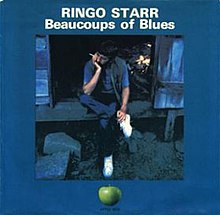
Carl Lee Perkins was an American guitarist, singer and songwriter. A rockabilly great and pioneer of rock and roll, he began his recording career at the Sun Studio, in Memphis, beginning in 1954. Among his best-known songs are "Blue Suede Shoes", "Honey Don't", "Matchbox" and "Everybody's Trying to Be My Baby".
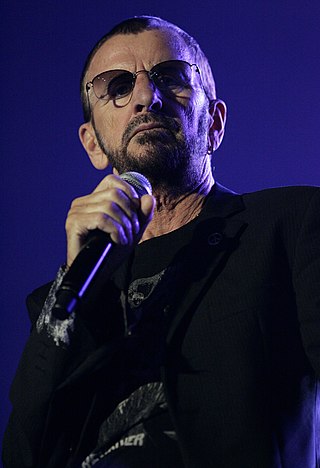
English musician Ringo Starr has released 20 studio albums and 49 singles. Starr achieved international fame as a member of British rock band the Beatles.
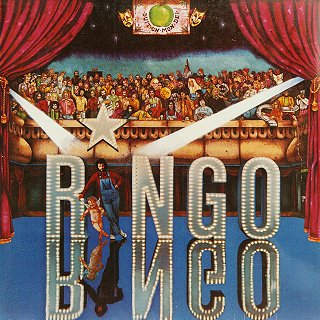
Ringo is the third studio album by English musician Ringo Starr, released in 1973 on Apple Records. It peaked at No. 7 on the UK Albums Chart and No. 2 on the Billboard 200 and has been certified platinum by the RIAA. In Canada, it reached No. 1 on the RPM national albums chart.
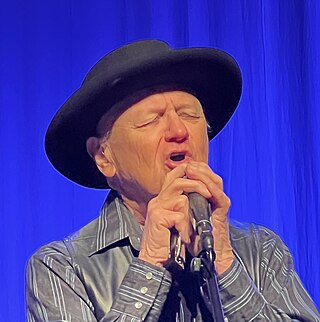
Charlie McCoy is an American harmonica virtuoso and multi-instrumentalist in country music. He is best known for his harmonica solos on iconic recordings such as "Candy Man", "He Stopped Loving Her Today", "I Was Country When Country Wasn't Cool", and others. He was a member of the progressive country rock bands Area Code 615 and Barefoot Jerry. After recording with Bob Dylan in New York, McCoy is credited for unknowingly influencing Dylan to decide to come to Nashville to record the critically acclaimed 1966 album "Blonde on Blonde".
The Great American Songbook is the loosely defined canon of significant 20th-century American jazz standards, popular songs, and show tunes.
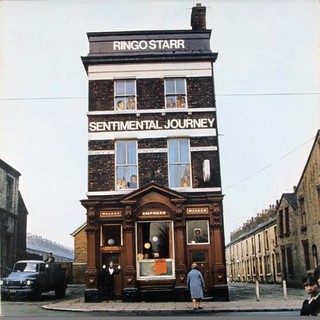
Sentimental Journey is the debut solo album by English rock musician Ringo Starr. It was released by Apple Records in March 1970 as the Beatles were breaking up. The album is a collection of pre-rock 'n' roll standards that Starr recalled from his childhood in Liverpool. As a departure from the experimental quality that had characterised solo LPs by George Harrison and John Lennon since 1968, it was the first studio album by an individual Beatle to embrace a popular music form.

Beaucoups of Blues is the second studio album by the English rock musician and former Beatle Ringo Starr. It was released in September 1970, five months after his debut solo album, Sentimental Journey. Beaucoups of Blues is very far removed in style from its pop-based predecessor, relying on country and western influences. A longtime fan of the genre, Starr recorded the album over three days in Nashville with producer Pete Drake and an ensemble of local session players. Beaucoups of Blues failed to chart in Britain but achieved moderate commercial success in the United States, where it reached number 35 on Billboard's Country Albums list and number 65 on the Billboard Top LPs chart.

Blast from Your Past is a compilation album by English rock musician Ringo Starr, released on Apple Records in 1975. It is both Starr's first compilation LP and his final release under his contract with EMI. It was also the last album to be released on the Beatles' Apple label until it was revived in the 1990s.

"It Don't Come Easy" is a song by English rock musician Ringo Starr that was released as a non-album single in April 1971. It was produced by Starr's former Beatles bandmate George Harrison, who also helped write the song, although only Starr is credited. Recording for the track took place in March 1970 at Trident Studios in London, with overdubs added in October. Starr and Harrison performed the song together in August 1971 at Harrison's Concert for Bangladesh shows in New York City, a recording from which was released on the live album of the same name. Starr has continued to perform it in subsequent decades with his All-Starr Band.
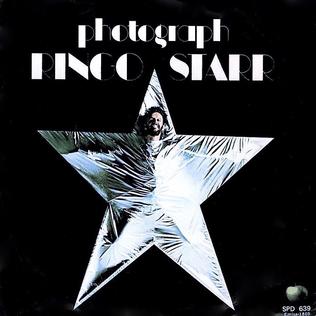
"Photograph" is a song by English rock musician Ringo Starr that was released as the lead single from his 1973 album Ringo. Starr co-wrote it with George Harrison, his former bandmate from the Beatles. Although they collaborated on other songs, it is the only one officially credited to the pair. A signature tune for Starr as a solo artist, "Photograph" was an international hit, topping singles charts in the United States, Canada and Australia, and receiving gold disc certification for US sales of 1 million. Music critics have similarly received the song favourably; Stephen Thomas Erlewine of AllMusic considers it to be "among the very best post-Beatles songs by any of the Fab Four".
"I'm the Greatest" is a song written by English musician John Lennon that was released as the opening track of the 1973 album Ringo by Ringo Starr. With Starr, Lennon and George Harrison appearing on the track, it marks the only time that three former Beatles recorded together between the band's break-up in 1970 and Lennon's death in 1980. Lennon wrote the song in December 1970 as a wry comment on his rise to fame, and later tailored the lyrics for Starr to sing. Named after one of Muhammad Ali's catchphrases, the song partly evokes the stage-show concept of the Beatles' 1967 album Sgt. Pepper's Lonely Hearts Club Band.
Startling Music Ltd. is a music publishing company, founded in 1968 by singer, songwriter and musician Ringo Starr, drummer of the Beatles.
Studio 19, originally named Music City Recorders, is a music studio in Nashville, Tennessee. It was founded in late 1964 by Bill Connor and Scotty Moore, original guitar player for Elvis Presley. Originally located on Nashville's Music Row, the studio relocated in 2015 after the original building was sold and demolished.

"If Not for You" is a song by American singer-songwriter Bob Dylan from his October 1970 album New Morning. It was issued as the A-side of a single in Europe in early 1971. The song is a love song to Dylan's first wife, Sara Dylan. He recorded it several times in 1970; the session for the released version took place in New York in August. He also recorded the song with George Harrison on May 1, soon after the break-up of the Beatles, a session that attracted much speculation in the music press. The May recording remained unreleased until its inclusion on The Bootleg Series Volumes 1–3 in 1991.
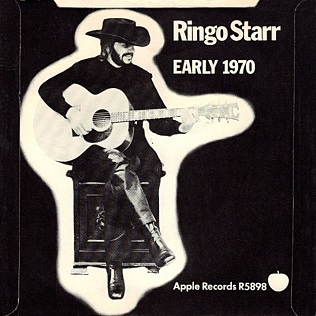
"Early 1970" is a song by English rock musician Ringo Starr that was released as the B-side of his April 1971 single "It Don't Come Easy". A rare example of Starr's songwriting at the time, it was inspired by the break-up of the Beatles and documents his relationship with his three former bandmates. The lyrics to the verses comment in turn on Paul McCartney, John Lennon and George Harrison as individuals, and the likelihood of each of them making music with Starr again. In the final verse, Starr offers a self-deprecating picture of his musical abilities and expresses the hope that all four will play together in the future. Commentators have variously described "Early 1970" as "a rough draft of a peace treaty" and "a disarming open letter" from Starr to Lennon, McCartney and Harrison.
"Sunshine Life for Me (Sail Away Raymond)" is a song by English musician Ringo Starr from his 1973 album Ringo. It was written by George Harrison, Starr's former bandmate in the Beatles, and was one of several contributions Harrison made to Ringo. Recording for the song took place in Los Angeles in March 1973, with Richard Perry as producer. In addition to Starr and Harrison, the musicians on the track include Levon Helm, Robbie Robertson, Rick Danko and Garth Hudson of the Band, and multi-instrumentalist David Bromberg.
"Behind That Locked Door" is a song by English rock musician George Harrison from his 1970 triple album All Things Must Pass. Harrison wrote the song in August 1969 as a message of encouragement to Bob Dylan, who was making a highly publicised comeback to the concert stage, accompanied by the Band, with a headlining performance at the Isle of Wight Festival. "Behind That Locked Door" is a rare Harrison composition in the country music genre and the second song dealing with the friendship between himself and Dylan, after their 1968 collaboration "I'd Have You Anytime". Its lyrics address Dylan's elusive nature, and reflect the high regard in which Harrison held the American singer's work. The same reluctance on Dylan's part to re-engage with a concert audience led to him retreating again from live performance until August 1971, when he responded to Harrison's request to play at the Concert for Bangladesh.

"Oh My My" is a song by English musician Ringo Starr from his 1973 album Ringo. It was also issued as the third single from the album, becoming a top-five hit in the United States and Canada. The recording was produced by Richard Perry and includes backing vocals by Merry Clayton and Martha Reeves.

"All That I've Got (I'm Gonna Give It to You)" is a song by American soul musician Billy Preston that was released in January 1970 as his third single on Apple Records. It was written by Preston and his fellow Apple artist Doris Troy and produced by George Harrison. In the United States, the single missed the Billboard Hot 100 chart, peaking at number 108. According to Harrison, the song was Preston's musical response to criticism that he had abandoned his black soul roots by embracing rock music.
